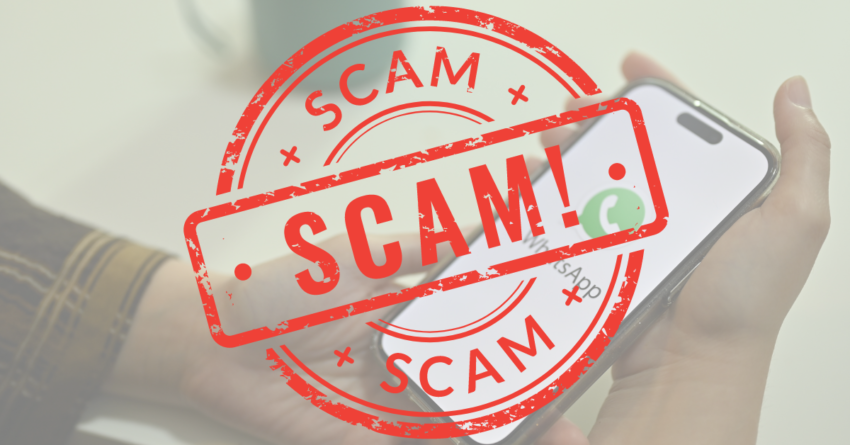With more than 2 billion users globally, WhatsApp has emerged as one of the most widely used messaging services in the modern digital era. However, fraudsters find it to be an extremely appealing target because of how frequently it is utilized. Fake investment programs and job offers are only two examples of the many ways that WhatsApp fraudsters are targeting gullible users. We’ll look at the various kinds of WhatsApp scams in this article, along with how to spot them and, most importantly, how to stay safe.
Types of WhatsApp Scams
WhatsApp Job Scams
One common type of scam on WhatsApp involves fake job offers. Fraudsters pose as hiring managers or business executives and promise high-paying positions with little work. They may say they came across your CV on the internet or that your LinkedIn profile impressed them. They usually require payment for application fees, background checks, or training materials after earning your trust. They may also ask for personal information, including your Social Security number. As soon as they have your money or personal information, the deceivers vanish, and these jobs don’t exist.
WhatsApp Dating Scams
Another common problem that mostly affects people who are looking for love online is WhatsApp dating scams. Fraudsters frequently fabricate profiles on dating apps or social media sites, swiftly switching the topic to WhatsApp. Sometimes over weeks or months, they develop an emotional bond with the victim before pretending to be having financial difficulties. They can request payment for expenses related to travel, health care, or a purported emergency. They could even try to use private images or personal information as a form of blackmail in certain situations.
WhatsApp Crypto scams
As cryptocurrencies have grown in popularity, so too have WhatsApp crypto frauds. Although these deceptions can take many different forms, they frequently feature claims of rapid and significant returns on investments made in cryptocurrency initiatives. Deceivers may take on the personas of friends, prominent members of the cryptocurrency community, or investment advisors who promise to make large sums of money with a certain plan. They will present compelling stories and even fictitious testimonies, but as soon as you send them money or divulge private details, the deceivers disappear with your money.
WhatsApp Phishing Scams
These deceptions involve getting messages that seem to be from a reliable source, such as your bank, a government organization, or even WhatsApp itself. Frequently, these communications include a link to a fake website intended to steal your personal information, financial information, or login credentials. A fraud can say that there is a risk to your account or that you must authenticate yourself to save it from being suspended. Clicking on these links and entering your information could lead to identity theft or financial harm.
WhatsApp Lottery Scams
These deceptions deceive users into thinking they have won a substantial amount of money or a priceless item in a lottery or competition they never participated in. Deceivers frequently pose as well-known businesses, celebrities, or organizations and demand payment to release the victim or pay for taxes and other overhead. They might also request the details of your bank account, which hackers might use to withdraw money from your account, to transfer the winnings.
How to Protect Yourself from WhatsApp Scams?
By taking preventative measures, you can greatly lower your vulnerability to WhatsApp scams. Here are some suggestions:
- Turn on Two-Step Verification: To further secure your account, WhatsApp provides a two-step verification option. By requiring a PIN to be entered while re-registering your phone number with WhatsApp, this feature helps shield your account from unwanted access.
- Exercise Caution When Sharing Personal Information: Never use WhatsApp to share login credentials or personal financial information. If there are any questions about the authenticity of a request, use official channels to communicate directly with the organization or individual.
- Verify Contacts: Spend some time confirming the identity of everyone you interact with on WhatsApp, particularly if they are making an offer or requesting information. This can be accomplished by making a phone call, visiting the official website, or doing an internet search for information about the person or group.
- Ignore Suspicious Messages: It’s better to disregard messages that seem suspicious or that appear to have come from an unknown sender. Don’t enter any information or click any links.
- Report Deceptions to WhatsApp: You can report a contact to WhatsApp if you come across a deception. Open the chat window, tap the contact’s name, then scroll down and choose “Report Contact” to accomplish this. This aids WhatsApp in taking legal action against con artists and safeguarding other users.
- Update your app frequently: Make sure you have the most recent version of WhatsApp installed, as these upgrades frequently come with security improvements guarding against new frauds and vulnerabilities.
- Educate Yourself and Others: Stay updated with the most recent WhatsApp scams and let your friends and family know about them. Deceivers will find it more difficult to succeed the more people are aware of these schemes.
Conclusion
Although WhatsApp is an effective tool for communication, users should be on the lookout for the increasing number of frauds that prey on them. You can take proactive steps to safeguard yourself and avoid falling for WhatsApp scams by being informed of the different kinds of deceptions that occur and learning how to spot them. Never forget that anything is probably off if it looks so. Keep others informed about these deceptions, exercise caution, and be vigilant.
Are you a Victim of WhatsApp Scams?
If you have fallen victim to WhatsApp scams, contact the Scam Help Center. In addition to helping you get your money back, we provide a free consultation to walk you through the procedure. Get in touch with us for expert assistance and support in getting your hard-earned money back.
Check out the list of Scam Brokers
Visit our Facebook page – Scam Help Center

